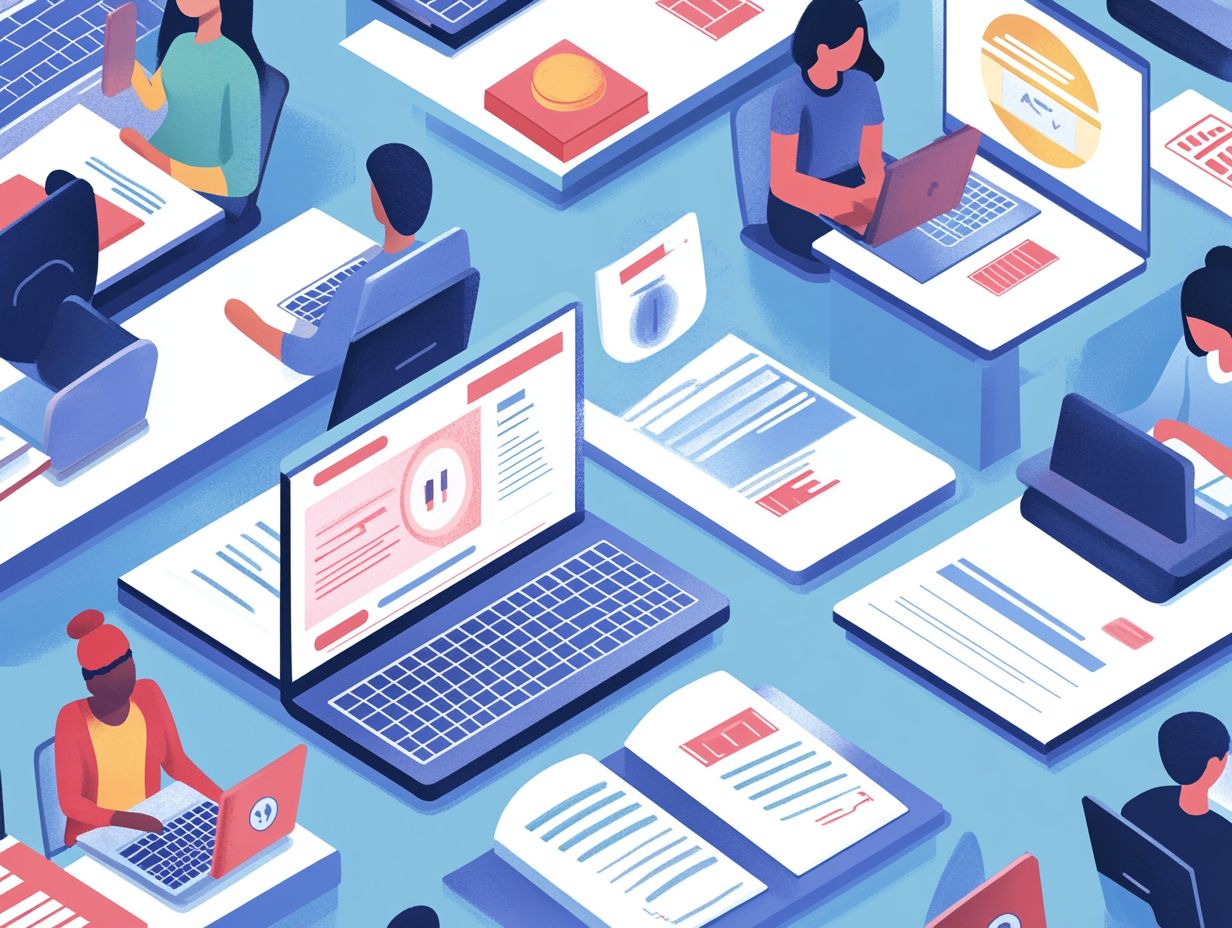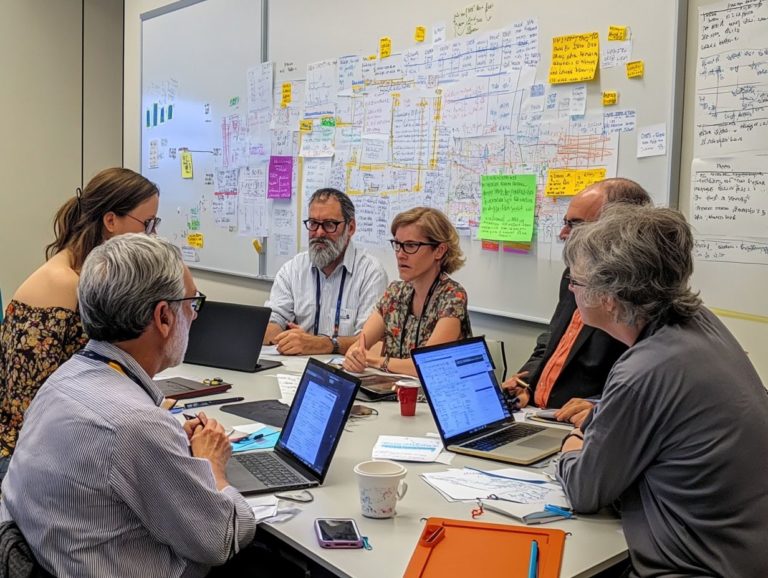The Future of Educational Certifications in a Digital World
In an increasingly digital world, traditional educational pathways are transforming, giving rise to a surge in digital certifications. These credentials open up incredible opportunities, including enhanced accessibility, cost savings, and real-time skills assessments, making them attractive to learners from all walks of life.
This article delves into the impact of digital certifications on education, the important role technology has in their growth, and offers practical guidance on how to obtain and showcase these essential credentials. Explore how embracing digital certifications can redefine your career and enhance your learning journey.
Contents
- Key Takeaways:
- Defining Digital Certifications
- The Benefits of Digital Certifications
- The Impact of Digital Certifications on Traditional Education
- The Role of Technology in Digital Certifications
- Emerging Technologies and Their Impact
- How to Obtain and Showcase Digital Certifications
- Frequently Asked Questions
- Why Are Educational Certifications Crucial in Today s Digital Landscape?
- How will digital technology change the way educational certifications are obtained?
- Will traditional educational institutions be replaced by online certification programs?
- How will the value of educational certifications be affected by digital credentials?
- What are the potential drawbacks of digital educational certifications?
- How can individuals prepare for the future of educational certifications in a digital world?
Key Takeaways:

- Digital certifications offer increased accessibility and flexibility, allowing individuals to learn and demonstrate skills at their own pace and on their own schedule.
- They also provide cost savings compared to traditional education options.
- The use of emerging technologies in digital certifications is revolutionizing the ways in which skills are assessed and validated, creating new opportunities for learning and career advancement.
Defining Digital Certifications
Digital certifications represent a revolutionary shift in the landscape of education and professional development in the 21st century. By earning credentials through online courses and advanced educational technology, you validate your knowledge and skills across a variety of disciplines.
This approach makes learning easier and more personal for individuals worldwide. As digital learning continues to rise, these certifications are reshaping traditional educational models and career trajectories, providing you with flexible and innovative pathways to showcase your competencies and advance your career.
The Benefits of Digital Certifications
Digital certifications present a wealth of benefits tailored to meet the evolving demands of learners and professionals in today s dynamic job market. They position themselves as an essential aspect of education’s future by enhancing both accessibility and flexibility, enabling you to engage in self-directed learning while collaborating with educational communities, regardless of where you are in the world.
They also offer significant cost savings compared to traditional education methods, promoting a more inclusive approach to skill development and lifelong learning.
Accessibility and Flexibility
The accessibility and flexibility of digital certifications are key elements that enable you to pursue your educational goals without the limitations of traditional classroom settings. This mode of learning enables you to access a wide array of online courses and resources from anywhere in the world, as long as you have broadband access.
This fosters a culture of self-direction and community building among diverse student populations. In today’s fast-paced world, where you might be juggling work, family, and education, these attributes become especially significant.
With remote learning options, you can tailor your schedule to align with your personal commitments, ensuring that your quest for knowledge remains both manageable and effective. Group learning experiences, where you work with others online, enhance your educational journey by allowing for shared insights and diverse perspectives.
However, the effectiveness of these learning formats heavily depends on reliable broadband access. Consistent internet connectivity allows you to interact seamlessly with peers and instructors, enriching your overall educational experience.
Start your journey with digital certifications today and unlock new career possibilities!
Cost Savings
One of the significant savings of digital certifications is the cost when compared to traditional education paths, like attending universities or colleges.
By embracing online learning tools and courses, you can access top-notch resources and training without the burden of substantial debt. This makes it easier to achieve long-term career growth and enhance your skills.
For example, online courses typically cost much less than in-person classes. This allows you to sidestep expenses related to commuting, housing, and textbooks. You also have the freedom to learn at your own pace, keeping your job while pursuing your studies.
This flexibility alleviates immediate financial pressures while boosting your earning potential. Individuals with digital certifications may find themselves in line for promotions or new job opportunities sooner than those with traditional degrees.
These economic advantages create a more sustainable career trajectory, enabling you to invest in further education or personal development down the road.
Real-Time Skills Assessment

Real-time skills assessment is a vital component of digital certifications, providing you with immediate feedback. This helps you grasp your progress and effectiveness in acquiring new skills.
This feature, seamlessly integrated into educational technology platforms, personalizes your learning journey. It allows you to adapt your study methods and efficiently achieve your desired outcomes.
These assessments elevate your learning experience by offering tailored feedback. They also enable educators to pinpoint gaps in skills and knowledge among their students.
The fusion of advanced analytics and AI-driven algorithms, which use artificial intelligence to analyze data, plays a crucial role in crafting individualized learning pathways. This directs your focus to the areas that need improvement.
With this level of technological support, you can engage in a more dynamic learning process. It enhances your retention of information and ultimately boosts your performance in real-world applications.
The ability to track your progress in real time is invaluable, transforming your learning environment into one that is interactive and responsive.
The Impact of Digital Certifications on Traditional Education
The emergence of digital certifications has significantly transformed traditional education, highlighting the impact of technology on educational certifications and presenting challenges and opportunities to navigate in this era of rapid technological advancement.
As more learners lean towards online courses and flexible learning options, educational institutions must reassess their curricula and teaching methods to remain relevant.
This shift tests the established educational framework while paving the way for innovative reforms and collaborative learning experiences.
Challenges and Opportunities
The rise of digital certifications brings both challenges and exciting opportunities, prompting a rethink of how academic certificates are issued and perceived in light of the global demand for educational certifications.
Consider issues like ensuring quality control, gaining recognition for digital credentials, and adapting to innovative educational practices all while embracing the potential for enhanced career opportunities for students.
These challenges push educational leaders to create robust frameworks for evaluating the integrity and credibility of digital certifications. Any inconsistency can erode trust among employers and learners alike.
As you face the need for standardization, a unique opportunity arises to collaborate on creating universally accepted digital credentials. This promotes cross-institutional recognition.
This shift opens the door to exciting new teaching methods, such as integrating real-world projects into learning pathways. This allows learners to acquire relevant skills that align with industry demands.
By prioritizing quality assurance and forming new partnerships, educational institutions can turn these challenges into catalysts for meaningful progress.
The Role of Technology in Digital Certifications
Technology is essential in the development and implementation of digital certifications. It provides you with a seamless learning experience through advanced platforms and learning management systems.
As emerging technologies transform the educational landscape, they unlock new avenues for personalized and interactive learning experiences—elements that are crucial for the success of educational certifications in lifelong learning in today’s digital environment.
Act now to embrace the future of learning!
Emerging Technologies and Their Impact
Emerging technologies like artificial intelligence (AI) and interactive courses have transformed the field of online certifications, offering you more effective and engaging educational experiences.
These advancements do more than just improve how educational content is delivered; they create personalized learning pathways that cater to your diverse needs. This ultimately increases the relevance and value of digital certifications in today s job market.
By utilizing smart computer programs that help tailor learning to individual needs, educators can assess your individual learning style and adjust content to suit you. This ensures you grasp complex concepts at your own pace.
Interactive learning tools encourage collaboration with your peers, fostering a dynamic environment that promotes knowledge sharing and collective problem-solving.
These technologies empower you to take control of your education while equipping you with skills that align with industry demands. This enhances your employability and prepares you for future challenges.
How to Obtain and Showcase Digital Certifications

Obtaining and showcasing digital certifications can significantly elevate your professional profile and pave the way for new career opportunities.
Numerous platforms and methods are at your disposal, allowing you to earn these valuable credentials through online courses offered by esteemed educational institutions and industry leaders.
After you earn your certifications, it’s time to showcase them! Knowing how to effectively highlight them on your resume and professional profiles is essential, as it demonstrates your competencies to potential employers in a compelling manner.
Platforms and Methods for Obtaining Certifications
You ll find a myriad of platforms and methods available for obtaining digital certifications. These range from well-established online course providers to innovative educational technologies. Organizations like Khan Academy and Maven, alongside education influencers such as Richard Culatta and Steven W. Anderson, have played pivotal roles in popularizing various online courses and digital credentials tailored to meet diverse learning needs.
Platforms like Coursera and edX offer an impressive selection of courses from top universities. You can earn certified credentials that can significantly enhance your career prospects. These platforms not only provide structured learning paths but also adapt to your unique schedule, making education more accessible than ever.
For those focused on professional development, specialized sites like LinkedIn Learning offer certifications in skills that are highly relevant to your industry. The endorsements and recommendations from influential figures in education lend additional credibility to these platforms. This guides you toward the most suitable options while fostering a culture of continuous, personalized growth in both your personal and professional journey.
Effectively Highlighting Certifications on Resumes and Profiles
Effectively showcasing your digital certifications on resumes and professional profiles is crucial for making a lasting impression on potential employers and advancing your career.
By utilizing clear and concise formatting and emphasizing relevant certifications tied to the job at hand, you can significantly enhance your chances of standing out in a competitive job market.
- Begin by creating a dedicated section for certifications. Position it strategically near the top of your resume or profile to capture immediate attention.
- When listing your certifications, be sure to include the name of the credential, the issuing organization, and the date you received it.
- Tailor your certifications to align with specific job descriptions. This demonstrates your suitability for the position; analyze keywords in the job listing and ensure your highlighted skills resonate with employer expectations.
This approach not only showcases your qualifications but also reflects your dedication to continuous learning and professional development.
Frequently Asked Questions
Why Are Educational Certifications Crucial in Today s Digital Landscape?
Educational certifications hold great importance in a digital world as they serve as proof of a person’s skills and knowledge. With the rise of online learning and remote work, having a recognized certification can give individuals a competitive edge and increase their employability.
How will digital technology change the way educational certifications are obtained?

Digital technology is changing how we obtain educational certifications. Online platforms and virtual testing are now popular alternatives to in-person classes and exams, highlighting trends in IT certifications.
Will traditional educational institutions be replaced by online certification programs?
Online certification programs are gaining popularity. However, traditional institutions will still offer courses and degrees that online programs can t fully replicate.
How will the value of educational certifications be affected by digital credentials?
Online certificates, like digital badges, are being recognized more in the job market. This boosts the value of educational certifications, making them easier to verify and share.
What are the potential drawbacks of digital educational certifications?
One downside of digital certificates is the risk of fraud. Employers need to verify digital credentials carefully to ensure authenticity.
How can individuals prepare for the future of educational certifications in a digital world?
To get ready for the future of educational certifications, individuals should keep up with online learning technology. They should also research reputable certification programs and update their skills regularly.






